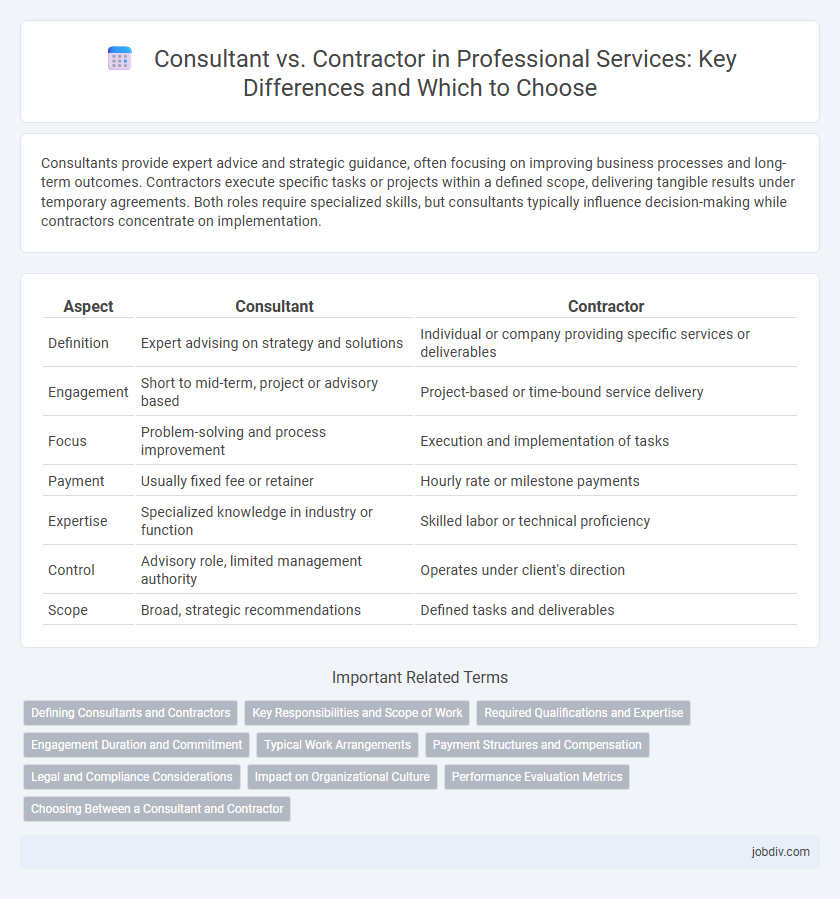Consultants provide expert advice and strategic guidance, often focusing on improving business processes and long-term outcomes. Contractors execute specific tasks or projects within a defined scope, delivering tangible results under temporary agreements. Both roles require specialized skills, but consultants typically influence decision-making while contractors concentrate on implementation.
Table of Comparison
| Aspect | Consultant | Contractor |
|---|---|---|
| Definition | Expert advising on strategy and solutions | Individual or company providing specific services or deliverables |
| Engagement | Short to mid-term, project or advisory based | Project-based or time-bound service delivery |
| Focus | Problem-solving and process improvement | Execution and implementation of tasks |
| Payment | Usually fixed fee or retainer | Hourly rate or milestone payments |
| Expertise | Specialized knowledge in industry or function | Skilled labor or technical proficiency |
| Control | Advisory role, limited management authority | Operates under client's direction |
| Scope | Broad, strategic recommendations | Defined tasks and deliverables |
Defining Consultants and Contractors
Consultants provide expert advice and specialized knowledge to organizations, often working on a project basis without direct involvement in day-to-day operations. Contractors are hired to perform specific tasks or services, typically delivering tangible results or completing defined projects within a set timeframe. Both roles contribute to business objectives but differ in scope, responsibility, and engagement terms.
Key Responsibilities and Scope of Work
Consultants primarily provide expert advice, strategic planning, and specialized knowledge to improve organizational processes and decision-making, often working on a project basis with defined deliverables. Contractors execute specific tasks or projects within a set timeframe, focusing on implementation, construction, or operational functions based on client requirements. The scope of work for consultants tends to be advisory and analytical, while contractors engage in hands-on, practical execution.
Required Qualifications and Expertise
Consultants typically possess specialized expertise and advanced degrees tailored to strategic advisory roles, often backed by extensive industry experience and certifications relevant to their field. Contractors generally require practical skills and certifications aligned with specific project tasks, emphasizing technical proficiency and hands-on experience in their trade or discipline. Both roles demand a clear demonstration of qualifications, but consultants focus on analytical and strategic capabilities while contractors prioritize operational and executional expertise.
Engagement Duration and Commitment
Consultants typically engage in short to medium-term projects, offering specialized expertise with flexible time commitments tailored to client needs. Contractors often enter longer-term agreements, dedicating more consistent on-site involvement and integrated team participation. The choice between consultant and contractor depends on the required engagement duration and the level of organizational commitment desired.
Typical Work Arrangements
Consultants typically engage in project-based assignments with clearly defined deliverables, working independently or as part of a consulting firm for a fixed duration. Contractors often enter into time-bound contracts to perform specific operational tasks or technical services directly under the client's supervision. Both arrangements emphasize flexibility, but consultants usually offer strategic expertise while contractors provide hands-on execution.
Payment Structures and Compensation
Consultants typically receive fixed fees or hourly rates based on the scope and duration of a project, often invoicing periodically with detailed deliverables outlined in contracts. Contractors are frequently compensated through time-and-material or milestone-based payment structures, reflecting ongoing labor and resource allocation. Understanding these differences is essential for budgeting, ensuring compliance with tax regulations, and managing cash flow effectively in professional engagements.
Legal and Compliance Considerations
Consultants typically engage under service agreements emphasizing advisory roles with defined deliverables, while contractors operate under contracts specifying work scope and timelines, impacting tax and labor law classifications. Legal distinctions affect compliance obligations such as intellectual property rights, liability insurance, and confidentiality clauses critical to risk mitigation. Understanding jurisdiction-specific regulations ensures proper classification and adherence to labor standards, preventing costly legal disputes and penalties.
Impact on Organizational Culture
Consultants often bring external perspectives that challenge existing organizational norms, fostering innovation and adaptability in company culture. Contractors typically integrate into established workflows, maintaining continuity without significantly altering core cultural values. The choice between consultant and contractor roles influences whether cultural transformation or preservation is prioritized during project execution.
Performance Evaluation Metrics
Performance evaluation metrics for consultants typically emphasize qualitative outcomes such as strategic insights, problem-solving effectiveness, and stakeholder engagement, reflecting their advisory role. Contractors are more often assessed using quantitative metrics like project completion time, budget adherence, and compliance with technical specifications, which align with their task-oriented responsibilities. Clear differentiation in evaluation criteria ensures alignment with the distinct contributions and expectations of consultants versus contractors in professional settings.
Choosing Between a Consultant and Contractor
Choosing between a consultant and a contractor depends on the project scope and expertise required; consultants provide strategic advice and specialized knowledge, while contractors execute specific tasks or deliverables. Consultants often engage for short-term advisory roles to improve business processes, whereas contractors are typically hired for hands-on implementation and operational work. Evaluating project goals, budget constraints, and required skill sets helps ensure the right choice between advisory services and execution capabilities.
Consultant vs Contractor Infographic

 jobdiv.com
jobdiv.com